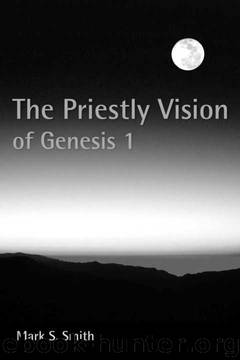The Priestly Vision of Genesis I by Mark S. Smith

Author:Mark S. Smith
Language: eng
Format: mobi, epub
Published: 2009-11-18T06:48:00+00:00
Chapter 1: Three Models of Creation
1. See the fine surveys of Paul Beauchamp, Creation et separation: Etude exegetique du chapitrc premier de la Genese, LD 346-73; and Clifford, Creation Accounts (Intro., n. 2), 137-97.
2. See the emphasis on this point by Pope Benedict XVI (Cardinal Joseph Ratzinger), in the Beginning...': A Catholic Understanding of the Story of Creation and the Fall (trans. Boniface Ramsey, O.P.; Huntington, Ind.: Our Sunday Visitor Publishing Division, 1990), 24.
3. In alluding to creation, Isaiah 45:18 uses all three of these verbs, and it adds another one, "to establish" (that comes from the root, °ku;n). The model of procreation underlies the verbs in Psalm 90:2 (compare the related image for human creation by God in Dent. 32:18; cf. the model of weaving for the divine making of the human person in the womb in Ps. 139:15). In extrabiblical texts, human reproduction is a common model in the creation of the universe, including the generation of deities. See Clifford, Creation Accounts, 45, 86-90 106, 111. For the verbs of creation generally, see also Dennis J. McCarthy "Creation Motifs in Ancient Hebrew Poetry," CBQ 29 (1967), 393-406. For the verb °qny, "to establish," as a verb of creation, see also Clifford, Creation Accounts, 118. On the root °br', see p. 224.
4. These are all ways of expressing the fundamental connection of the divine to the world; through these, humanity can be linked to the divine. These expressions for this sense of linkage are what I would call "biblical ontologies," which convey the basic sense of the very being of creatures connected to (or "participating in") the reality of God. For example, as we will see shortly, the power of the human king draws on, or "participates in," the power of the divine warrior-king. This idea of ontology goes back to the medieval metaphysical idea of the "Great Chain of Being," which understood finite beings as "participating in" the Being, which is God. Their being in this sense derives from the Being of God. For examples in the ancient Near Eastern context, see my book, God in Translation: Deities in Cross-Cultural Discourse in the Biblical World (FAT series I, volume 57; Tubingen: Mohr Siebeck, 2008) 14, 48, 69, 298-99; and see further below. The Bible shows various pictures of reality that are analogous in some ways to later philosophical descriptions.
5. My three models are quite close to Keel and Schroer, Scheipfung (Intro, n. 2) 100-135. Their four models are creation as procreation and birth (see the following note); manufacture; conflict; and as spell, command, and word of command ("Machtwort" in the German original, Schop fung. Biblische Theologien im Kontext altorientalischer Religionen [Gottingen: Vandenhoeck & Ruprecht; Freiburg Schweiz: Universitatsverlag, 2002] 100-35). Compared with Keel and Schroer, I put more emphasis on various forms of divine presence and wisdom and less on procreation and birth; the latter is relatively less common in biblical material. The listing of Keel and Schroer is richly informed by ancient Near Eastern textual and iconographic parallels, and it is highly recommended to interested readers.
Download
The Priestly Vision of Genesis I by Mark S. Smith.epub
This site does not store any files on its server. We only index and link to content provided by other sites. Please contact the content providers to delete copyright contents if any and email us, we'll remove relevant links or contents immediately.
The Power of Habit by Charles Duhigg(3124)
Man's Search for Meaning by Viktor E. Frankl(2665)
Mckeown, Greg - Essentialism: The Disciplined Pursuit of Less by Mckeown Greg(2427)
MOSES THE EGYPTIAN by Jan Assmann(2411)
Devil, The by Almond Philip C(2324)
The Complete Dead Sea Scrolls in English (7th Edition) (Penguin Classics) by Geza Vermes(2270)
Unbound by Arlene Stein(2267)
I Capture the Castle by Dodie Smith(2034)
Schindler's Ark by Thomas Keneally(1876)
The Invisible Wall by Harry Bernstein(1799)
The Gnostic Gospel of St. Thomas by Tau Malachi(1782)
The Bible Doesn't Say That by Dr. Joel M. Hoffman(1676)
The Secret Doctrine of the Kabbalah by Leonora Leet(1601)
Political Theology by Carl Schmitt(1577)
The Jewish State by Theodor Herzl(1533)
A History of the Jews by Max I. Dimont(1523)
The Dead Sea Scrolls Bible by Martin G. Abegg(1506)
The Book of Separation by Tova Mirvis(1485)
Oy!: The Ultimate Book of Jewish Jokes by David Minkoff(1361)
